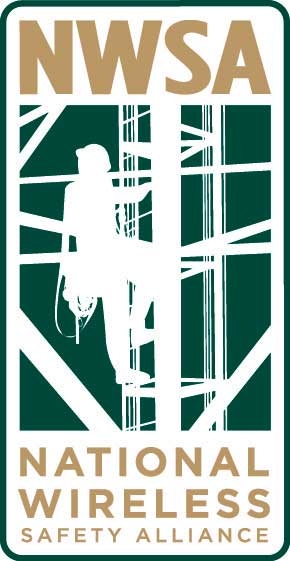In response to OSHA’s request for information regarding communication tower safety due by Monday, the National Wireless Safety Alliance provided an emphatic ‘yes’ to the agency regarding its question: Is there a need for a standardized, industry-wide training or certification program?
 Provided by NWSA consultant Chuck Slagle, a former Sprint EH&S executive, the safety alliance said, “The NWSA will standardize the assessment and certification process and provide a greater degree of confidence to the industry that an employee who is trained in Massachusetts and an employee trained in California (at the same level of worker category), are qualified to perform the competencies and scope of work required of their work title.”
Provided by NWSA consultant Chuck Slagle, a former Sprint EH&S executive, the safety alliance said, “The NWSA will standardize the assessment and certification process and provide a greater degree of confidence to the industry that an employee who is trained in Massachusetts and an employee trained in California (at the same level of worker category), are qualified to perform the competencies and scope of work required of their work title.”
The NWSA said that an NWSA certification card “will raise the bar on safety and quality.”
NWSA is the second industry association to reply to OSHA’s RFI on Wireless Estimator’s module that uploads all responses to the official OSHA Communication Tower Safety docket. The National Association of Tower Erectors provided their comments yesterday.
The only other known program being established for worker certification is the Telecommunications Industry Registered Apprenticeship Program (TIRAP), a joint venture of telecommunications companies, the U.S. Department of Labor and the Federal Communications Commission. The organization has not provided a progress report since its initial founding announcement last October.
Jim Maddux, Director of the OSHA Directorate of Construction, is an advisor to TIRAP. He is also the agency contact for OSHA’s RFI.
The full response from the NWSA is:
Yes, a national assessment and certification organization has been needed in the wireless industry for quite some time. Recognizing this need, the industry has collaborated to establish the National Wireless Safety Alliance (NWSA); the assessment and certification organization that is currently under development. The mission of the NWSA is to provide thorough, independent assessments of knowledge and skills and provide verifiable worker certification in order to enhance safety, reduce workplace risk, improve quality, encourage training and recognize the skilled professionals who work on towers and other non-standard structures.
The organization and operation of the NWSA will be in compliance with the International ISO/ANSI/IEC Standard 17024. The NWSA will evaluate workers to credential their skill level via practical skills assessment and computer based knowledge tests in accordance with ISO/ANSI/IEC Standard 17024. Testing will not favor or endorse any training method. The NWSA does not train.
The NWSA will standardize the assessment and certification process and provide a greater degree of confidence to the industry that an employee who is trained in Massachusetts and an employee trained in California (at the same level of worker category), are qualified to perform the competencies and scope of work required of their work title. Workers, regardless of their training pathway, will be required to take standardized NWSA skills assessment and computer based knowledge testing. An NWSA certification card will be a source of pride for industry workers and will ultimately raise the bar on safety and quality.
In order to accomplish its objectives, the NWSA organization is in the process of developing written and practical skill assessments for various levels of worker categories outlined in the National Wireless Skills-Based Training Matrix. The NWSA is also forging strategic partnerships with a nationally renowned third party testing firm and a prominent website certification database firm. A Board of Governors representing a broad cross-section of industry stakeholders will be appointed in the near future to provide oversight for the organization.
The NWSA plans to offer a variety of certification categories based on defined categories of workers within the industry. The NWSA is planning a gradual, progressive roll out of these respective programs to the marketplace. It is anticipated that the Signal Person, Rigger I and Rigger II programs will be the first to launch. The Telecommunications Tower Technician I (TTTI – Authorized Climber) and Telecommunications Tower Technician II (TTTII – Competent Climber) programs will likely be the next programs to launch.
Other assessment and certification programs the NWSA will likely develop include Antenna & Line Foreman, Tower (Stacking Foreman), Structural Modifications, Foreman, DAS Systems, Small Cell Systems, Broadcast Structures and Outside Plant/Fiber to the Home and Business.
Additionally, the NWSA organization will offer national, portable worker certification that will be verifiable through a database to ensure that worker credentials are current.
Industry companies, training providers and education institutions will ultimately be able to access the NWSA’s Skills-Based Training Matrix and NWSA Certification Handbooks from the NWSA website. These organizations will be able to utilize these resources to ensure that their respective training programs are instructing to the knowledge-based competencies and field-based competencies required for each worker certification category.
The NWSA is raising the bar on safety and quality and have a positive, transformational impact on the entire industry long-term. NWSA certification will benefit the following:
- Tower climbers, technicians and other industry workers will ultimately benefit through a safer working environment, opportunities to enhance/diversify their skill-sets and by receiving the recognition of national credentialing that these skilled professionals deserve.
- Contractor companies will ultimately benefit through a safe and qualified employee base by leveling the playing field for all companies. Simply put, NWSA’s national certification program will reward the contractor entities who do things the right way when it comes to safety and quality while at the same time forcing the “fly-by-night” contractors to raise their performance (through an investment in safety and quality) or to get out of the game.
- Tower owners (vertical real estate companies) will ultimately benefit through diminished liability exposure and by receiving greater assurance that the men and women working on their tower sites are adequately trained and prepared to perform the scope of work required to work on their valuable property.
- Wireless carriers will ultimately benefit by receiving a better quality network build-out from a reliable, safe and qualified contractor company. The carriers know that there is a direct correlation between their network performance quality and the qualifications of the contractor. The NWSA will provide wireless carriers with a national certification requirement to place in their contracts and ultimately provide greater assurances that the men and women working on their network build-outs will perform quality work.
- Equipment manufacturers will benefit by receiving greater assurance that their PPE equipment is being utilized properly and safely by more of the industry’s workforce.
- Industry training providers will benefit through the consistency of the uniform vernacular, worker categories, knowledge-based skills and field-based skills outlined in the NWSA’s National Wireless Skills-Based Training Standard.
- Government agencies will benefit by referencing and recognizing the NWSA’s national wireless skills-based consensus matrix and having a national assessment and certification organization that offers ANSI accredited programs.
Industry leaders have pledged to provide timely and relevant updates to the industry as key benchmarks are achieved in the establishment of the NWSA national assessment and certification program.



















